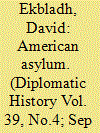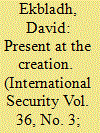| Srl | Item |
| 1 |
ID:
140745


|
|
|
|
|
| Summary/Abstract |
In 1939–1940, internationalists, with the approval of the Roosevelt administration, campaigned to transplant key technical organs of the League of Nations to the United States to aid in postwar planning and prevent fascist forces in Europe from co-opting the institution.
|
|
|
|
|
|
|
|
|
|
|
|
|
|
|
|
| 2 |
ID:
134190


|
|
|
|
|
| Publication |
2014.
|
| Summary/Abstract |
World War I was an epoch making event and its legacies have exerted dramatic impact on the unfolding of history as well as the study of history itself. The article introduces a commemorative volume focused on those varied legacies and their places in history.
|
|
|
|
|
|
|
|
|
|
|
|
|
|
|
|
| 3 |
ID:
108844


|
|
|
|
|
| Publication |
2011-12.
|
| Summary/Abstract |
Security studies, as an American field of inquiry, has particular historical origins. Contrary to standard views, it was the unraveling of the international order in the 1930s that compelled a collection of internationalist institutions and individuals, led by historian Edward Mead Earle, to bind together a variety of new and traditional disciplines to create an entirely new field focused on the problem of security. These institutions and individuals not only sought to confront the crisis at hand by influencing public views, altering academic discussion, enhancing government capacity, and creating an American "grand strategy," but also to establish strong institutional and intellectual foundations for an enduring scholarly project that would contended with future national security problems generated by the modern world. In this effort, Earle and his foundation, government, and university collaborators had significant influence on the evolution of security studies as a field that are still felt today.
|
|
|
|
|
|
|
|
|
|
|
|
|
|
|
|